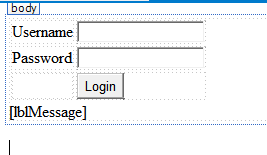Create Login page in asp.net using Stored Procedure
Create table in sql:
create table login(id int identity,username varchar(max),password varchar(max))
insert into login values('aravindh','aravindh')
create procedure:
create procedure sp_login(@username
varchar(max),@password varchar(max),@outres int OUTPUT)
as
set @outres = (select count(*) from login where username=@username and
password=@password)
if(@outres =1)
begin
set @outres = 1
end
else
begin
set @outres=0
end
Source Code(default.aspx)
<%@ Page Language="C#" AutoEventWireup="true" CodeBehind="WebForm1.aspx.cs" Inherits="WebApplication1.WebForm1" %>
<!DOCTYPE html>
<html xmlns="http://www.w3.org/1999/xhtml">
<head runat="server">
<title></title>
</head>
<body>
<form id="form1" runat="server">
<div>
<table>
<tr><td>Username</td><td><asp:TextBox ID="txtuser" runat="server" ></asp:TextBox></td></tr>
<tr><td>Password</td><td><asp:TextBox ID="txtpass" runat="server" TextMode="Password" ></asp:TextBox></td></tr>
<tr><td></td><td><asp:Button ID="btsub" runat="server" Text="Login" /></td></tr>
</table>
<asp:Label ID="lblMessage" runat="server" ></asp:Label>
</div>
</form>
</body>
</html>
Codebehind page(default.aspx.cs)
using System;
using
System.Collections;
using
System.Configuration;
using
System.Data;
using
System.Linq;
using
System.Web;
using
System.Web.Security;
using
System.Web.UI;
using
System.Web.UI.HtmlControls;
using
System.Web.UI.WebControls;
using
System.Web.UI.WebControls.WebParts;
using
System.Xml.Linq;
using
System.Data.SqlClient;
namespace login
{
public partial class _Default : System.Web.UI.Page
{
SqlConnection
con = new SqlConnection("Data Source=DEV007\\sqlexpress;Initial
Catalog=aravindh;Integrated Security=True");
protected
void Page_Load(object
sender, EventArgs e)
{
}
public int validate_login(string
username, string password)
{
//con.Open();
SqlCommand
cmd = new SqlCommand();
cmd.CommandType = CommandType.StoredProcedure;
cmd.CommandText = "sp_login";
cmd.Parameters.Add("@username", SqlDbType.VarChar).Value
= username;
cmd.Parameters.Add("@password", SqlDbType.VarChar).Value
= password;
cmd.Parameters.Add("@outres", SqlDbType.Int);
cmd.Parameters["@outres"].Direction = ParameterDirection.Output;
cmd.Connection = con;
int
Results = 0;
try
{
con.Open();
cmd.ExecuteNonQuery();
Results = (int)cmd.Parameters["@outres"].Value;
}
catch
(SqlException ex)
{
lblMessage.Text = ex.Message;
}
finally
{
cmd.Dispose();
if
(con != null)
{
con.Close();
}
}
return
Results;
}
protected
void btsub_Click(object
sender, EventArgs e)
{
int
results = 0;
if
(txtuser.Text != string.Empty &&
txtpass.Text != string.Empty)
{
results =
validate_login(txtuser.Text.Trim(), txtpass.Text.Trim());
if
(results == 1)
{
lblMessage.Text = "Login
is Good, Send the User to another page or enable controls";
}
else
{
lblMessage.Text = "Invalid
Login";
lblMessage.ForeColor = System.Drawing.Color.Red;
//Dont Give too
much information this might tell a hacker what is wrong in the login
}
}
else
{
lblMessage.Text = "Please
make sure that the username and the password is Correct";
}
}
}
}
